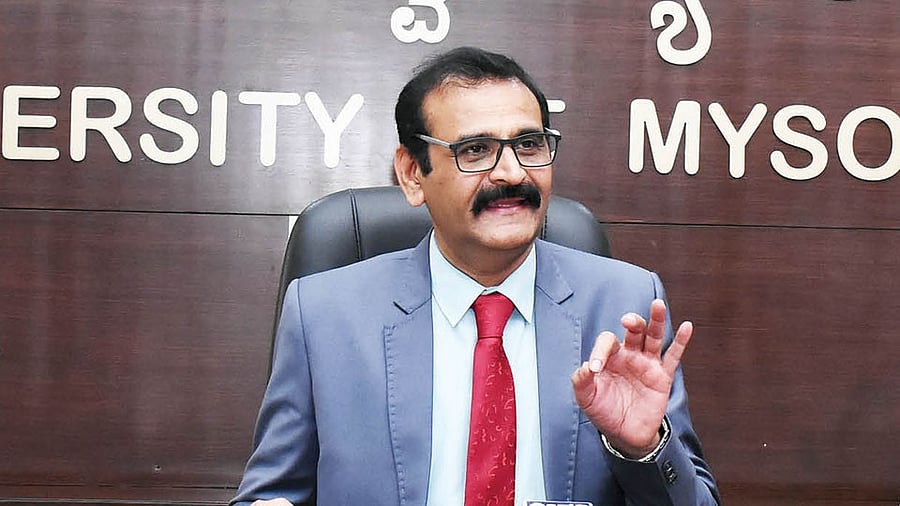
University of Mysore Vice-Chancellor N K Lokanath.
Mysuru: The Wadiyar kings of the Yadu dynasty, especially Mummadi Krishnaraja Wadiyar, were not like our present-day leaders, but scholarly and were concerned about the people, said University of Mysore (UoM) Vice-Chancellor N K Lokanath.
He was delivering the inaugural address of the national seminar on ‘Cultural Contributions of Sri Krishnaraja Wadiyar III’, organised by the Department of History of JSS College for Women, under JSS Mahavidyapeetha (JSS MVP), in association with the Oriental Research Institute (ORI), under the UoM, at Navajyothi Auditorium of the college, in Saraswathipuram, Mysuru, as an Internal Quality Assurance Cell initiative (IAQC), on Wednesday.
Lokanath said ORI, established by Maharaja Chamarajendra Wadiyar X in 1891, was the seed for the establishment of the UoM in 1916 by his son Nalvadi Krishnaraja Wadiyar. “The research and education initiatives taken up by the ORI are one of the main reasons for the expansion of higher education in the erstwhile Mysuru kingdom. The role of the Maharajas and their contributions to arts, culture, and education caused the transformation of Mysuru, to stand out as a developed state in the entire Indian sub-continent,” he said.
The VC said: "Even as we are progressing in education by adopting newer technologies and ideas, we should study the ancient Indian knowledge system. It will form a strong foundation for our future. Active listening is vital for students to grasp information, ideas, and concepts. They should note down the important points, for future reference. Our ancestors kept alive our knowledge system, by listening and reciting the scriptures,” he said.
Citing the 'stotra' penned by scholar R Shama Shastri, in memory of Mummadi Krishnaraja Wadiyar to mark his 140th anniversary, ORI Director D P Madhusudanacharya said the Maharaja was not just a Raja, but a Rajarishi, who contributed a lot for the welfare and progress of the people. The ORI Director was delivering the keynote address.
“Mummadi contributed a lot to religion, culture, arts, education, and vocations. He was an academic scholar, artist, writer, and poet. He patronised scholars, artists, writers and poets. He built self-sustained 'agraharas' for people to reside, built temples and renovated older ones; built shelters – choultries and 'mantapas' - for travellers in towns and along roads; funded temples across India – Kashi, Rameshwaram, Tirupati, etc – and built choultries and guest houses there for the convenience of devotees; put water and its sources into good use by laying canals and building lakes and ponds; dug wells; funded mutts and educational institutions for the benefit of students. Even Muslim institutions and dargahs were funded,” Madhusudanacharya said.
Retired tahsildar V Ranganatha spoke on ‘Social Welfare Works of Sri Krishnaraja Wadiyar III’, while professor Shalvapille Iyengar presided over the session.
Retired deputy director of ORI T V Sathyanarayana spoke on ‘Literary Works of Sri Krishnaraja Wadiyar III Srithavanidhi’ while retired professor S Narendra Prasad presided over the session.
Scholar H V Nagaraja Rao spoke on ‘Sri Krishnaraja Wadiyar III and Other Literary and Religious Works’ while Senior Assistant Director for Archives H L Manjunath presided over the session.
Director of general development division of JSS MVP K L Revanna Swamy, principal Rechanna, and coordinator of the seminar A G Dharmesha were present during the inaugural session.